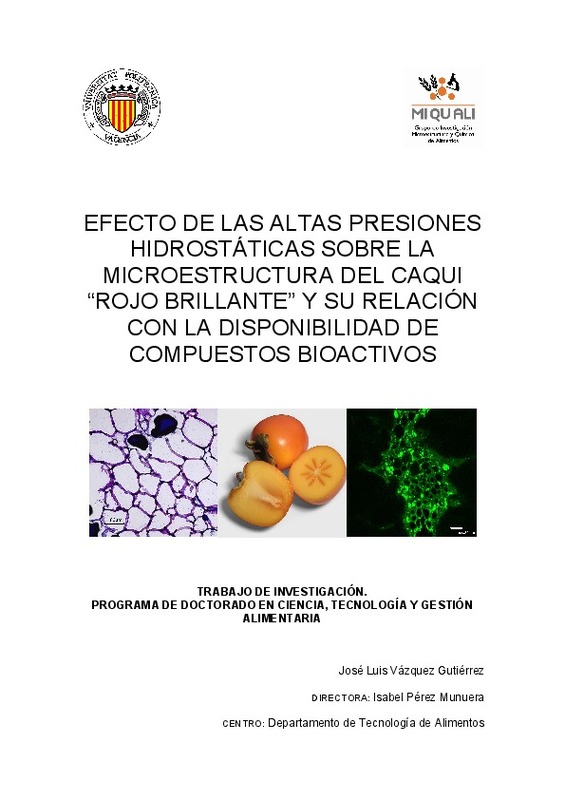JavaScript is disabled for your browser. Some features of this site may not work without it.
Buscar en RiuNet
Listar
Mi cuenta
Estadísticas
Ayuda RiuNet
Admin. UPV
EFECTO DE LAS ALTAS PRESIONES HIDROSTÁTICAS SOBRE LA MICROESTRUCTURA DEL CAQUI "ROJO BRILLANTE" Y SU RELACIÓN CON LA DISPONIBILIDAD DE COMPUESTOS BIOACTIVOS
Mostrar el registro sencillo del ítem
Ficheros en el ítem
| dc.contributor.advisor | Pérez Munuera, Isabel Mª
|
es_ES |
| dc.contributor.author | Vázquez Gutiérrez, José Luis
|
es_ES |
| dc.date.accessioned | 2012-01-27T13:39:30Z | |
| dc.date.available | 2012-01-27T13:39:30Z | |
| dc.date.created | 2007 | |
| dc.date.issued | 2012-01-27 | |
| dc.identifier.uri | http://hdl.handle.net/10251/14591 | |
| dc.description.abstract | El caqui es una importante fuente de compuestos fenólicos, fibra dietética y carotenoides, cuya biodisponibilidad está directamente relacionada con el procesado. Muestras de dos estados distintos de maduración de caqui de la variedad "Rojo Brillante" con y sin tratamiento de desastringencia (95-98% CO2) fueron tratadas por altas presiones hidrostáticas (APH) a 200 y 400 MPa durante 1, 3 y 6 minutos. Se realizó un estudio de la microestructura mediante Microscopía Electrónica de Barrido a Bajas Temperaturas, Microscopía Óptica y Microscopía Láser Confocal de Barrido (Cryo-SEM, LM y CLSM) y se analizó el contenido en sólidos solubles totales (SST) y algunas propiedades texturales. El objetivo de este estudio fue el análisis del efecto de las APH sobre la microestructura del caqui "Rojo Brillante" en distintos estados de madurez y su relación con la disponibilidad de compuestos bioactivos. El análisis de la microestructura mostró que la aplicación de APH produce rotura de paredes celulares y dispersión de componentes intracelulares en el tejido, mejorando así la disponibilidad de compuestos de interés nutricional como taninos, fibra y carotenoides. El contenido en SST disminuye en las muestras astringentes al aplicar APH, atribuyéndose este hecho a la precipitación de los taninos solubles, lo cual podría permitir la eliminación del tratamiento de desastringencia con CO2 en muestras procesadas con APH. El tratamiento con APH provocó una disminución generalizada de la firmeza en ambos estados de maduración y un aumento de la cohesividad en las muestras más maduras. ABSTRACT: Persimmon fruit is an important source of phenolic compounds, dietary fiber and carotenoids, whose bioavailability is directly connected with processing. Samples from persimmon fruit cv. "Rojo Brillante" from two different ripening stages, with and without deastringency treatment (95-98% CO2), were treated with high hydrostatic pressure (HHP) at 200 and 400 MPa during 1, 3 and 6 minutes. A microstructural study using Cryo Scanning Electron Microscopy, Light Microscopy and Confocal Laser Scanning Microscopy (Cryo-SEM, LM and CLSM) was carried out. Total soluble solids content (TSS) and some textural properties were also analyzed. The aim of this study was the analysis of the effect of HHP on the microstructure of persimmon fruit cv. "Rojo Brillante" in different ripening stages and its relationship with bioactive compounds availability. The microstructural study showed that the application of HHP provokes cell wall disruption and intracellular components dispersion throughout the tissue, with an improvement in the availability of compounds with nutritional interest, such as tannins, fiber and carotenoids. TSS content diminishes in astringent samples when HHP is applied. This fact was attributed to the precipitation of soluble tannins. Therefore, deastringency treatment with CO2 could be omitted in samples treated with HHP. An overall decrease in firmness in both ripening stages and an increase in cohesiveness in the more advanced one were caused by HHP treatment. | es_ES |
| dc.format.extent | 21 | es_ES |
| dc.language | Español | es_ES |
| dc.publisher | Universitat Politècnica de València | es_ES |
| dc.rights | Reserva de todos los derechos | es_ES |
| dc.subject | Caqui | es_ES |
| dc.subject | Altas presiones hidrostáticas | es_ES |
| dc.subject | Componentes bioactivos | es_ES |
| dc.subject | Microestructura | es_ES |
| dc.subject | Cryo-sem | es_ES |
| dc.subject | Clsm | es_ES |
| dc.subject | Propiedades texturales | es_ES |
| dc.subject | Persimmon | es_ES |
| dc.subject | High hydrostatic pressure | es_ES |
| dc.subject | Bioactive compounds | es_ES |
| dc.subject | Microstructure | es_ES |
| dc.subject | Textural properties | es_ES |
| dc.subject.classification | TECNOLOGIA DE ALIMENTOS | es_ES |
| dc.subject.other | Máster Universitario en Seguridad Industrial y Medio Ambiente-Màster Universitari en Seguretat Industrial i Medi Ambient | es_ES |
| dc.title | EFECTO DE LAS ALTAS PRESIONES HIDROSTÁTICAS SOBRE LA MICROESTRUCTURA DEL CAQUI "ROJO BRILLANTE" Y SU RELACIÓN CON LA DISPONIBILIDAD DE COMPUESTOS BIOACTIVOS | es_ES |
| dc.type | Tesis de máster | es_ES |
| dc.rights.accessRights | Abierto | es_ES |
| dc.contributor.affiliation | Universitat Politècnica de València. Servicio de Alumnado - Servei d'Alumnat | es_ES |
| dc.description.bibliographicCitation | Vázquez Gutiérrez, JL. (2007). EFECTO DE LAS ALTAS PRESIONES HIDROSTÁTICAS SOBRE LA MICROESTRUCTURA DEL CAQUI "ROJO BRILLANTE" Y SU RELACIÓN CON LA DISPONIBILIDAD DE COMPUESTOS BIOACTIVOS. http://hdl.handle.net/10251/14591 | es_ES |
| dc.description.accrualMethod | Archivo delegado | es_ES |






